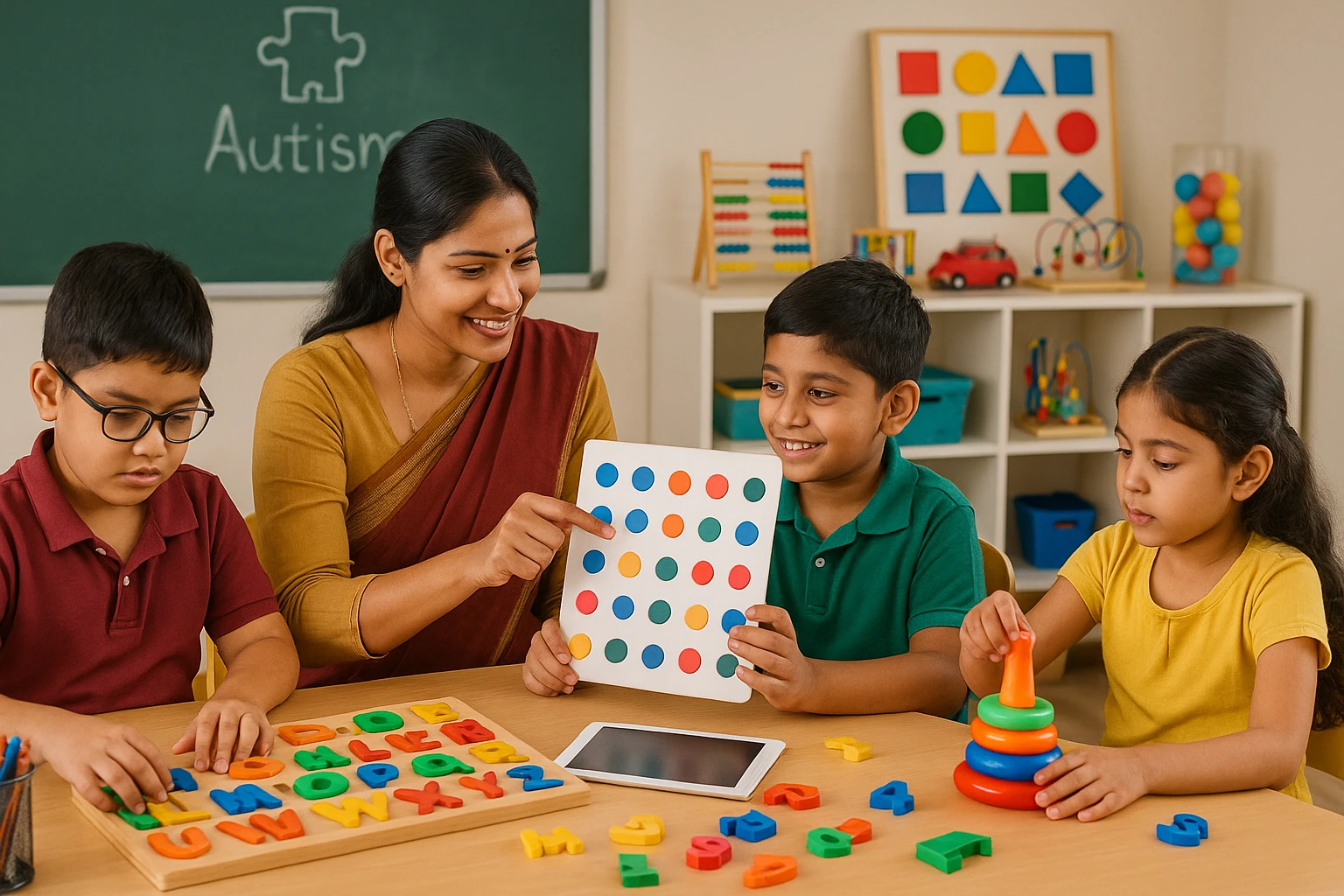
Some kids learn less easily than others, even if they appear equally able. Sometimes the indications are obvious because they can just look like forgetfulness, finding it hard to follow instructions or to read and write. These early pointers might indicate Specific Learning Difficulties, a range of challenges which influence how children engage and apply information. Spotting Specific Learning Difficulties early on can be a game-changer, allowing kids to get the support they require to shine.
This blog will cover topics such as Early Red Flags, Developmental Milestones vs. Learning Difficulties, Early Intervention’s Role, Assessment Guide, and Professional Support.
Early Red Flags: Subtle Signs you Might Overlook
In many cases the initial signs of Specific Learning Difficulties are often mistaken as signs of laziness, naughty behavior or just kiddish things. But when the signs become more of a predictable pattern it can be a warning sign that the child is facing some serious problem that is leading to his troubled behavior. Paying close attention to how a child behaves and performs educationally can help spot these early indicators.
Click here to download the LD Course brochure!
For more details of Best LD Course, Call / WhatsApp on +919321024137 / +919869866277.
Identifying behavioral patterns:
- Continuously getting annoyed while doing daily chores of tying shoelaces or organising shelves or bag.
- Evading any activities that include any reading, writing, or performing basic maths.
- Not following instructions or forgetting them despite getting repeat instructions.
- Low self-confidence or sudden disinterest in school and group activities.
Recognizing academic patterns:
- Consistent problems with phonics, such as confusing letter sounds or struggling to mix sounds into words.
- Not being able to have a steady and proper pencil grip due to which formation of letters can be an issue.
- Unpredictable nature of retention of information. The child can be super productive one day and extremely low performance the other day.
- Not being able to perform any operations based on concepts of sequencing or sorting.
The above early signs are quite tricky to be identified as a symptom for learning difficulties. Therefore, recognising these signs and connecting it to the difficulty that the child possesses needs thorough knowledge and careful observation. As mentioned earlier since there is a lot of overlapping between the Signs of Learning Difficulties and normal child behaviour there needs to be precise observation and jotting down smallest details.
When there is clear pattern of some important signs or missing of milestones there is a possibility of the child facing some learning or behavioural disorder that needs professional addressing that can help the child’s learning experience in the future.

Source: theteacherstraining
Developmental Milestones vs. Learning Difficulties
On ascertaining that a child is showing signs of struggle in certain areas it becomes important to determine whether there is a natural difference in development or a major underlying Cause of a Learning Difficulty.
Only when the correct diagnosis is attained can the appropriate guidance and support be provided to the child. There are cases when there is a slight delay in attaining any developmental milestones. But when this delay has a direct impact on the child’s progress pace and achieving of basic academic excellence that an average learner has it raises serious concerns about the child’s holistic progress and hints that the child might have some disorder that is slowing down his progress.
Key differences between a slow learner and a child with a Specific Learning Difficulty:
Consistency of Struggle
A slow learner usually show similar result across various activities, with time and practice regular improvement is observed in basic skills, even if it is slower than their age group. A kid with a Specific Learning Difficulty struggles in certain areas e.g. reading/writing etc. even with repeated efforts and extra help.
Type of Errors
Slow Learners often make general mistakes due to incomplete understanding. Children with Some striking features of learning difficulties include children writing mirror images of letters and numbers or while reading pronouncing the words incorrectly.
Response to Instruction
A child with specific learning difficulties will need tailor made instructions whereas a slow learner will need extra teaching or remedial teaching to cover the gap.
Overall Development
- In case of skill level child with learning difficulties may not show adequate progress in socio-emotional arena whereas slow learners can display slow progress in areas of socio-emotional development.
- Children with special needs are often gifted individuals with unique talents such as creativity, problem-solving and others.
Frustration and Behavior
Not being able to perform simple and basic tasks can lead the child to be filled with frustration, anxiety, and disappointment. This makes the child develop strong dislike towards doing any basic reading, writing or math operations because they fear that they will faulter while doing it that makes them anxious, angry, and even aggressive at times.
Knowing the difference between Specific Learning Difficulties and typical development helps parents and teachers in choosing appropriate treatments, support programs and assessments. Children are given the support they need to succeed when they are identified early.

The Role of Early Intervention
Early Intervention has a major and a crucial role to play in ensuring that the child is on the path to achieve a well-rounded academic journey enabling him to lead a wholesome life with respect and independence. When early intervention is given due emphasis any small learning gaps can be amended to prevent any major learning delays in the future. With the right support, children can build strong skills, greater confidence and a lasting love for education.
The importance of early support in the child’s academic journey
Solid groundwork
Early interventions start with teaching the child the most basic concepts starting with simple techniques such as holding a pencil, emphasis on phonics. When the child masters these basic skills it helps future learning easier and stress-free.
High Self-esteem
When the child can get back on track with his academics thanks to the early support he receives he gains immense confidence and has high morale to take on any challenges that lie ahead of him at school or even in the World around.
Self-confident and Independent
Achieving small milestones gives a huge boost to the child’s confidence that instils in him the confidence that he can function in a regular setup independently with ease and courage.
Socio-Emotional Progress
Emotional health and academic progress are corelated that implies with better academic progress the child is set on the path to be socially more approachable and is in charge of his emotions.
Customized Learning Approaches
Early intervention allows for the use of modified teaching methods suited to the kid’s unique needs, helping them absorb information more effectively.
Deterrence of any related problems.
A lot of the learning difficulties can be a trigger point for related problems such as any behavioural problems or poor social interaction skills. When the child is provided with appropriate support the related problems can be prevented as soon as possible.
Smoother Academic Progress
Children who get initial help often move through school with fewer breaks and less need for demanding services later.
By acting initial, parents and teachers offer children the tools they need not just to manage but to truly flourish in their educational and personal lives.

A Guide to Assessments and Professional Support
For any child to get access to professional help it is important to identify signs that helps educators to attain accurate diagnosis. Getting a formal diagnosis helps to consult the concerned professional who can then guide the child’s educators and parents with the best path forward.
Assessments offer valuable visions into a kid’s strengths and difficulties, making it easier to design effective support strategies.
Key points about assessments and professional help:
Importance of Early Assessments
Early assessments help to find out whether the child really possesses any type of learning difficulty. Once the learning difficulty is determined desired appropriate support and guidance can be made available for the child targeting the real areas of concern.
Types of Assessments
Based on the kid’s difficulties, professionals may recommend cognitive assessments, educational skill testing, speech evaluations or behavioral observations to get a full picture.
Choosing the Right Professionals
It is important to take help from certified experts who is specialize in Specific Learning Difficulties. Institutions like Vidhyanidhi Education Society (Govt. Regd.) not only provide assessments but also offer specialized training through their Learning Disability Course.
Role of Parents and Teachers
Families and teachers work closely with professionals to share observations and implement recommended approaches consistently across school and home settings.
Vidhyanidhi Education Society (Govt. Regd.) offers a well-structured Learning Disability Course that prepares educators, therapists and even parents to understand and manage Specific Learning Difficulties effectively. Enrolling in a Learning Disability Course prepares individuals with tools to identify early signs, support academic growth and make informed decisions for children’s development.
Spot the signs early and make a difference with the LD Course at Vidhyanidhi Education Society!
Click here to download the LD Course brochure!
For more details of Best LD Course, Call / WhatsApp on +919321024137 / +919869866277.
Specific Learning Difficulties
FAQs
What is the Scope of Disability Studies?
The study of disabilities prepares students for jobs in inclusive development, advocacy, education, and analysis by studying the social, cultural, and policy aspects of them.
Why do we Study Learning Disability?
Understanding learning disorders allows people to reach their full potential in school and life by identifying difficulties and creating specific methods.
Is 40% a Disability?
An initial disability level of 40% in India qualifies people for specific rights, benefits, and support programs.



